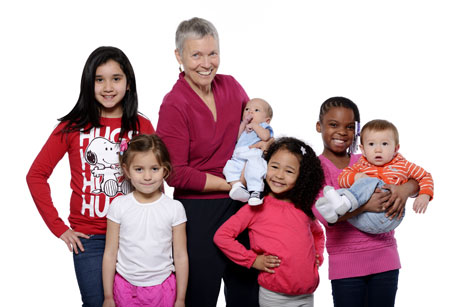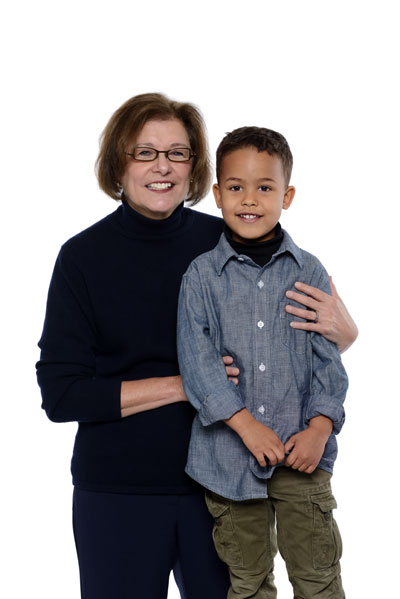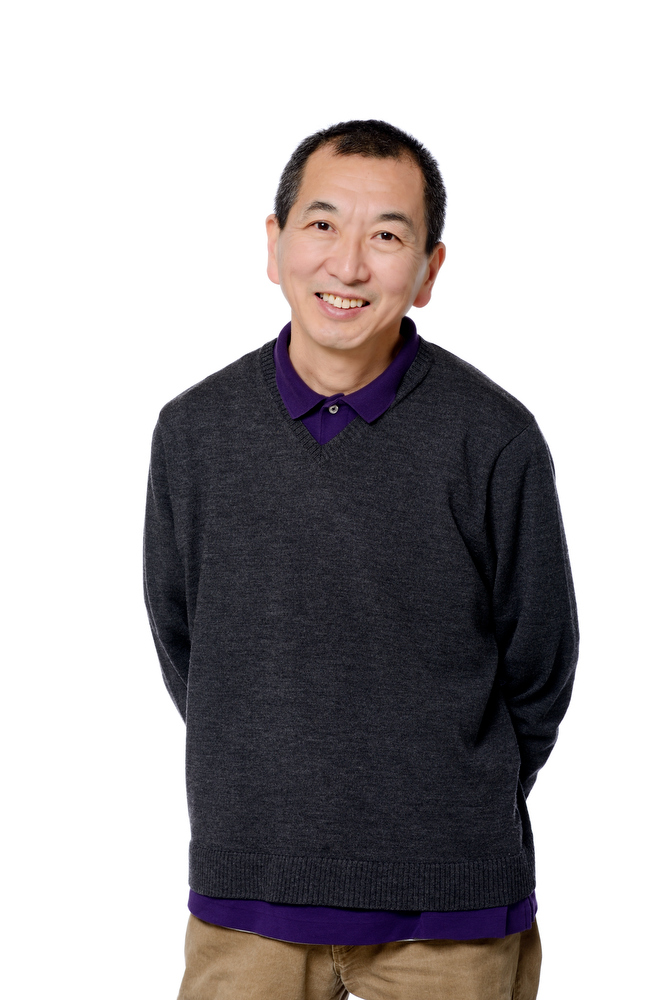What qualities coalesce to propel someone forward to super-selfless action?
Read the stories about this year’s superheroes and you’ll begin to comprehend what it takes to become a dedicated change-maker in our region.
Each of these honorees have enriched and enhanced the lives of children and families throughout Washington state. You’ll learn about a psychiatrist who has transformed mental health care for countless kids; an orchestra leader who inspires his students through beautiful music; a physician who helps disadvantaged parents learn ways to collaborate with their children’s schools.
And so many more.
We proudly celebrate these advocates and activists and applaud their tireless efforts to effect positive change in our communities. Superheroes, we salute you!
Meet our 2013 Superheroes
- Susan Enfield: The Crusader
- Elinor Graham, M.D., M.P.H.: The Visionary
- Bill Henningsgaard: The Change-Maker
- Mimi Siegel: The Humanitarian
- Deborah Wilds, Ph.D.: The Educator
- William ‘Bill’ Womack, M.D.: The Educator
- Richard Gold: The Mentor
- Janice Deguchi: The Advocate
- Marcus ‘Tsut’ Tsutakawai: The Conductor
- Laurie Valeriano: The Activist
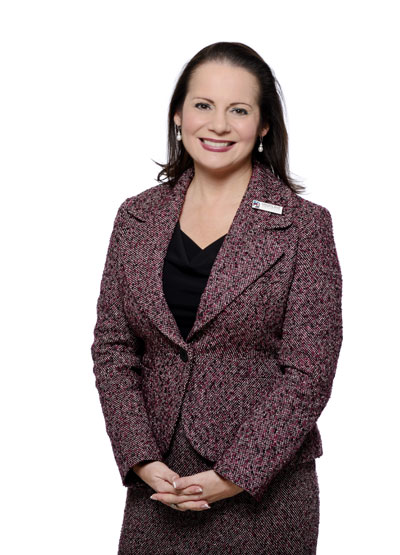
Susan Enfield: The Crusader
Highline School District superintendent
Susan Enfield radiates warmth, kinetic energy and a certain dynamism that exudes confidence to anyone near her fast-moving orbit.
She is steadfast and clear about her goal to provide quality education to the more than 17,000 students in the Highline School District. Enfield believes that every child can learn and deserves to be educated, regardless of mounting economic challenges.
Graduates have heard Enfield say, “Whatever you do in life, do something you are passionate about. At the end of the day, I wish you moments, like this one is for me. I do not have a shred of doubt that I was put here to do this work.”
While many educators and administrators grow weary and discouraged, Enfield gets up every morning inspired to keep doing the job, and do it better. Famous for her school visits, coffee chats and “soup with SUPE,” Enfield loves people. With her outgoing, engaging persona, she understands that achieving district goals rests on being collaborative, turning challenges into a collective exercise to address any obstacles that might impair her students’ success.
She magically integrates the questions and concerns she gleans from divergent thinkers with her own ideas, as she offers solutions to advance her dreams for her students.
Enfield worries whether the district’s nimble enough to ensure the academic outcomes necessary to equip students with the fundamental and competitive skills they need to thrive in today’s world. “You have to be willing to make good decisions that serve kids well, but not at expense of the adults,” says Enfield. “Don’t leave a trail of adult collateral damage in your wake. The systems can work for both.”
Highline Foundations president Bernie Dorsey felt from the moment they met that Enfield would be the kind of leader capable of bringing the best out in everyone she comes in contact with.
“We do our kids no service to pity them,” Enfield says. “At the end of the day, let's up the game. You show you love them by challenging them.”
—Alayne Sulkin
Who is your personal hero?
My dad.
What quality do you most admire in others?
Integrity.
Best recent read?
Bossypants by Tina Fey and Elizabeth the Queen by Sally Bedell Smith.
How do you take your coffee?
Cream and two Splenda, or a nonfat latte with two Splenda.
Elinor Graham, M.D., M.P.H.: The Visionary
Pediatrician
Retired pediatrician Elinor “Ellie” Graham built her career working with local children and their families at Harborview Medical Center and the University of Washington. But another passion drives her work for community change: giving parents and children the tools for success.
Through years of work for the Seattle–King County Department of Public Health, she observed “strengths and gifts” in low-income communities. “Seeing how often those gifts are not developed and allowed to flourish keeps me working on ways to provide opportunities for positive change,” Graham says.
Her efforts to equip families with the tools they need for positive social changes led her to establish several thriving community organizations. In 1988, she helped to establish Seattle’s first high school clinic, the Rainier Beach Teen Health Center, at Rainier Beach High School. The following year, Graham cofounded the nonprofit Parents for Student Success to teach disadvantaged parents how to partner with their children’s schools. (Parents for Student Success still conducts workshops and seminars in Seattle.)
After years of making house calls as a physician, she sensed a need to help fellow physicians understand the needs of local immigrant and refugee groups. In 1994, she helped to create Ethnomed, a website that centralizes information about culture, language and health for medical professionals serving patients from diverse ethnic backgrounds. Currently, she serves on its steering committee.
Ethnomed is an example of Graham’s innovative transformational alchemy, says Benjamin Danielson, M.D., medical director of Seattle’s Odessa Brown Children’s Clinic. “She taught me that a pediatrician could do so much more than use prescriptions to improve the health of children.
—Malia Jacobson
What most motivates you to give back to the community?
Being involved with families, children and our low-income communities and seeing their strengths and gifts keep me motivated.
How can we inspire today’s youth to pursue their biggest dreams?
We have to make it possible for them to pursue their biggest dreams with concrete programs that give them the tools and space to make this happen.
What qualities do you most admire in others?
Consistency, perseverance, humility, humor.
Best recent read?
Wait Till Next Year: A Memoir by Doris Kearns Goodwin.
How do you take your coffee?
I start my day with a hot drink made from a mix of roasted barley, rye, chicory, beet roots, cocoa, cinnamon and soy. Delicious!
Bill Henningsgaard: The Change-Maker
Executive director, Eastside Pathways
Bill Henningsgaard, like the coastal Oregon town of Astoria where he grew up, has a pronounced strength of character as well as charm. He lights up as he talks about Eastside Pathways, a partnership of organizations and individuals sharing a commitment to the idea that each and every child should have the chance to make the most of their lives.
Influenced by his civically engaged parents, Henningsgaard understood at a young age that being part of a community means helping to define and create the community’s life forces that affect so many.
His path to a high level of civic responsibility was not a linear one. “To be honest, I didn’t think much about public service as an undergraduate at Harvard, overseas in Norway or Scotland post-graduation or even at business school at Stanford,” he says.
But caring about his community was in Henningsgaard’s DNA. After years at Microsoft and traveling worldwide, he longed for a deeper connection with his town. Microsoft co-worker Paul Shoemaker had recently launched Social Venture Partners (SVP) and suggested that Henningsgaard join the board of one of SVP’s first investees, Youth Eastside Services.
After attending a Bellevue Schools Foundation coffee at Lake Hills Elementary School in January 2011, he “was stunned” to learn of the numbers of kids who were struggling to succeed in many of Bellevue’s elementary schools.
“They were facing hurdles connected to poverty, language and mobility, and our schools weren’t able to close the resulting gaps,” he says. “After that coffee, Roxanne Shepherd from Bellevue Schools Foundation and John Stokes [a Bellevue City Council member] and I had coffee; they were immediately taken with the collective impact potential. The conversation extended to the district, the city, key social service agencies and the college.”
By March 2011, Henningsgaard and his team had gathered 30 key community leaders for a discussion, and by June, they launched the organization with a 90-person kickoff. Today, Eastside Pathways has 40 partner organizations.
Eastside Pathways’ goal through collective action is to mobilize the entire community of Bellevue to support every child, step by step, from cradle to career.
“Our efforts to ‘connect the dots’ between all parts of our community enables us to help make the most of existing resources and make sure kids don’t fall through the cracks,” Henningsgaard says.
—AS
What most motivates you to give back to the community?
I enjoy this work. The people I’ve met and the sense of community and purpose are really gratifying. The closer I get to the schools and the community organizations that support kids and families, the more evident it is that they’re filled with dedicated and passionate people trying to change lives one kid at a time. It’s a privilege to get to know and work with them.
What qualities do you most admire in others?
I’m attracted to people who can see possibilities in the world around us. This community is full of those folks, which is the only explanation I can give why so many people and organizations have supported Eastside Pathways from the very beginning
Best recent read?
How Children Succeed by Paul Tough. Also, I like crime thrillers by James Lee Burke or Norway’s Jo Nesbø.
How do you take your coffee?
Drip, black. Plain Jane all the way.
Mimi Siegel: The Humanitarian
Executive director, Kindering
Mimi Siegel’s parenting journey began in 1972 with the premature birth of her daughter. At the time, available avenues of support for a new parent caring for a preemie proved depressingly difficult to find.
Years later, when Siegel and her family moved to the Seattle area, she applied for a part-time job at Kindering, a not-for-profit neurodevelopmental center founded in 1962 by five Eastside mothers of preschoolers with disabilities. At Kindering, Siegel found not merely a job — she discovered her calling. “My own start as a parent connected me through the heart to this organization and to what we at Kindering call the ‘unexpected journey’ that our families have experienced.”
Siegel, who celebrates her 35th anniversary at Kindering later this year, describes the center’s work in easing early intervention pathways for children with special needs and their families as “a labor of love.” The impacts of Kindering and of Mimi Siegel’s leadership — she’s executive director — are striking: Today, Kindering helps more than 3,000 infants and children with special needs each year here at home in Washington.
The ripple effect goes well beyond our state’s borders, given the role Kindering has played over the decades in influencing national movements, and in creating program and operational blueprints for other centers like it around the country and the world.
Siegel’s admiring colleagues laud her as a skilled and compassionate leader, a prudent yet innovative steward of Kindering’s mission, an encouraging mentor, a community treasure. For Siegel, the work is its own deepest personal reward. She speaks with reverence and relish about the culture of excellence at Kindering, her inspiring mandate to innovate new programs to address community needs (what she calls “the puzzle of the work”) and the web of service organization relationships that help to create a safety net for the most vulnerable among us.
And how about this for a definition of job satisfaction?
“I am motivated by the fact that we have created answers. Our graduates are out in the community, and they are doing really well. We’ve not only given them hope, we’ve given them success.”
—Patty Lindley
Who is your personal hero?
My husband and two children. They have each sought different paths, focused on different priorities, and chosen different ways of relating to each other and to others. They have taught me that there really is no one right way of doing things, that all ways are authentic and earnest.
What quality do you most admire in others?
Integrity, but I don’t mean that in a shallow way — I mean a congruence, a cohesiveness of character and actions in the world.
What qualities do you try to cultivate in yourself?
Thinking bigger and bolder for Kindering is something I am always stretching to do. I’ve heard the term “raging incrementalism” used — I think that describes me and how we’ve built Kindering, program by program. I want to challenge myself to take some bigger leaps for the organization.
Best recent read?
I am reading Theodore Rex by Edmund Morris. Roosevelt was a fascinating and complex man.
How do you take your coffee?
Grande nonfat latte.
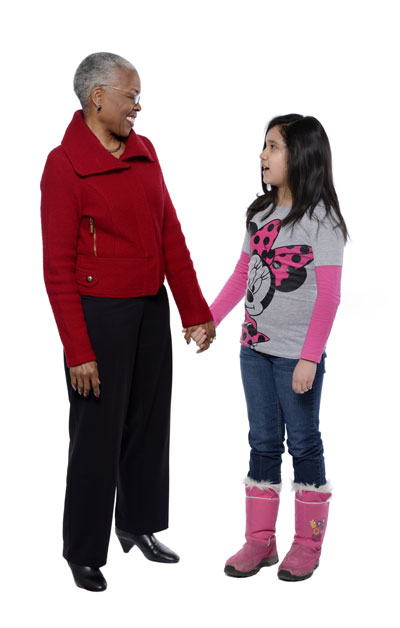
Deborah Wilds, Ph.D.: The Educator
Deborah Wilds’ devotion to education began early. Her family experiences informed and influenced her interests and what turned out to be her razor-sharp focus on learning.
Originally from northern California, Wilds, a middle child sandwiched between four brothers, had parents who saw education as the way to better both circumstances and opportunities.
“When I was in high school, I worked hard,” she says. “I wasn’t the smartest student in class, but my parents pushed me.”
Wilds is president and chief operating officer of the College Success Foundation (CSF), which works to inspire underserved, low-income students to finish high school, and helps provide the support and scholarships they need to graduate from college.
She credits mentors who encouraged her and helped pave the way for her to maximize her educational prospects. Ultimately, she earned a Ph.D. in education policy, planning and administration from the University of Maryland.
Professionally, she served as senior program officer for education at the Bill & Melinda Gates Foundation, was deputy director of the American Council of Education’s Office of Minorities in Higher Education, and is the co-author of several books.
“She gets things done,” says her friend and colleague Constance W. Rice, Ph.D., managing director for Knowledge Management. “She has high goals and follows through on all of them.”
Wilds’ determination to help kids from low-income backgrounds evolved from experiences growing up in a working-class family with a father who never had the opportunity to go to college.
She — and CSF — view education as the greatest lever out of poverty. “You can’t underestimate the importance of parents; learning how to support their children in their pursuit of a college degree is critical, especially if that parent has not completed college. We help support students, but also inform parents.”
—Linda Morgan
What most motivates you to give back to the community?
My love and my passion for young people. My mom was trained as a teacher. Education is in my DNA. I believe in the power of education to change lives.
How can we inspire today’s youth to pursue their dreams?
By helping them understand who they are, what their gifts and talents are, and not putting limits on how they can use those talents to make a difference in the world.
What do kids need to succeed?
It’s important to help them make a connection — to find them mentors and understand their interests and help them look at career options.
What is your greatest contribution to CSF?
As president, I help to ensure the stability of the organization, and provide leadership and vision moving forward.
How do you take your coffee?
Straight coffee with cream, dark roast.
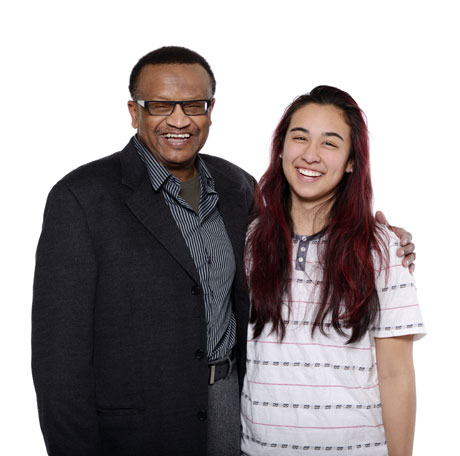
William ‘Bill’ Womack, M.D.: The Educator
Child psychiatrist
Over a long career in Seattle, now retired child psychiatrist Dr. William “Bill” Womack has helped to reshape mental health care for countless local children, improving processes and programs at Seattle Children’s Hospital and at a number of local juvenile detention centers. Womack also is considered a role model for minority youth, a role he doesn’t take lightly; he credits his own role models with paving the way for his success.
Womack, who grew up in the segregated South, says his role models were his mother and her sister, both schoolteachers; his uncle, a veterinarian; and his father, a high school principal.
“They were successful in a society that said they had no right to be successful,” he says. “They helped me understand that helping others with your innate talents can only lead to more success and happiness.”
After completing medical school at the University of Virginia, Womack came to Seattle for an internship at the University of Washington in 1961. He’s been a happy Seattleite ever since.
Ruth Benfield, R.N., vice president of Seattle Children’s psycho-social services, has worked with Womack in multiple roles over the past two decades. “Dr. Womack has consistently acted in the best interest of the child being served,” she says. “He is a valuable spokesperson, able to articulate the need for system improvement in ways that can be heard.”
Like any pioneer, Womack knows how to make a point with humor and compassion. Mark Fadool, M.S., L.M.H.C., worked with Womack at local juvenile detention centers and at Odessa Brown Children’s Clinic, where he serves as clinical director of mental health services. “Dr. Womack brings a wonderful blend of humble wisdom mixed with compassion, common sense and delightful sense of humor to everything he does.”
—MJ
What most motivates you to give back to the community?
I grew up in the South in an era of segregation; but in the midst of the racial nastiness, I had good friends, a family that was very supportive and encouraging, and teachers who wanted me to succeed.
How can we inspire today’s youth to pursue their biggest dreams?
Self-esteem, confidence and knowing what talents we have are the building blocks to dream aspiration and accomplishment.
What quality do you most admire in others?
The ability to listen and to recognize the absolute beauty of uniqueness in everyone.
Best recent read?
My grandson, Zane (11 years old), turned me on to The Hunger Games, a young adult story of grit, determination and using one’s talents in the face of somewhat formidable odds.
How do you take your coffee?
Tall, double raspberry mocha.
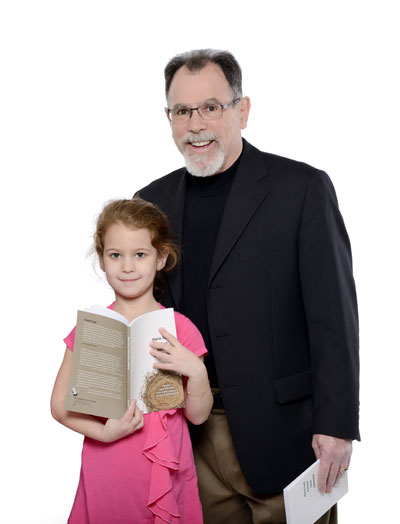
Richard Gold: The Mentor
Founder, Pongo Publishing Teen Writing Project
Perhaps one of the youths Richard Gold once helped put it best. “It was like an ambulance coming to a car wreck,” says the young man of Gold’s program, Pongo Publishing Teen Writing Project. The nonprofit had helped the man learn poetry while he was a teen in a psychiatric hospital.
Pongo was founded 17 years ago by Gold, a poet and youth counselor who got his start by volunteering to teach writing to special-needs and street kids in San Francisco.
The Pongo program’s volunteers have worked with 6,000 kids in the state’s juvenile detention and psychiatric facilities, helping teens learn to use poetry to process childhood trauma. Sometimes, volunteers get only 30 minutes with a youth, but that time results in reduced stress, increased coping tools, healing — and, says Gold, beautiful, moving poetry.
In addition to working directly with teens — many of whom have been abused, abandoned, raped and exposed to other forms of violence — Pongo publishes annual anthologies of their work and runs an interactive website that helps teens remotely. Gold is writing a book on his methodology so that other groups can replicate its success.
—Natalie Singer-Velush
What most motivates you to give back?
When kids talk honestly about their pain and their feelings, it’s at a level of humanity that reflects on society but also speaks to me personally. I’ve learned from them in ways that were unexpected. And my volunteers are very dedicated; they invest themselves in their work, they’re loyal, they care deeply about the kids, but [this process] impacts them personally as well. The work we do is the business of life. It’s a great privilege. Bearing witness to tragedy enables us to bear witness to our own loss and pain, which is something very human.
How can we inspire today’s youth to pursue their dreams?
If you value what young people have to say, they will tell you the truth in the most purposeful and idealistic way. The young people who do angry and destructive things are those who haven’t been listened to. It’s a very simple task, to listen.
What quality do you most admire in others?
I admire a combination of intelligence, sensitivity and humility. The people who can really listen to others are the people who have that level of humility to know their own vulnerability. It’s empathy, but the highest form of empathy includes intelligence and humility.
How do you take your coffee?
French roast, brown sugar.

Janice Deguchi: The Advocate
Executive director, Denise Louie Education Center
As executive director for Seattle’s Denise Louie Education Center, Janice Deguchi specializes in advocating for children so that they can advocate for themselves.
Promoting self-advocacy is at the heart of the Denise Louie center’s mission; the 35-year-old program got its start in Seattle’s Chinatown–International District and today serves more than 300 children younger than 5 years old, many from immigrant communities, with top-quality preschool, multicultural early learning services and educational programs.
“I need to do work that I can believe in,” says Deguchi. “That’s what first led me to the social service sector. The work we do at Denise Louie Education Center matters immensely.”
An avid mentor, Deguchi is known for taking parents and Denise Louie staff to Olympia to meet with state legislators on behalf of early learning programs. Her role as past president of the Washington State Association of Head Start and the Early Childhood Education and Assistance Program (ECEAP) allowed her to help serve more than 20,000 low-income children and families in Washington. Deguchi has also served on a number of statewide initiatives, including the Washington Early Learning Guidelines Advisory Committee.
As the parent of two school-age children in Seattle, Deguchi knows firsthand the importance of rich early learning experiences.
“Janice understands the needs and complex issues facing families — she gets it!” says Mai Nguyen, director of finance and operations for the Puget Sound affiliate of the Susan G. Komen for the Cure and a personal friend of Deguchi. “She spends her time fighting for every kid to have the same access to learning so they can be kindergarten ready.”
— MJ
What most motivates you to give back?
I stay inspired by the great work of the staff and the involvement of so many of our parents.
How can we inspire today’s youth to pursue their biggest dreams?
Children copy everything we do. If they see their parents taking on leadership, working, going to school and being engaged in the community, the children will be inspired to do the same.
What quality do you most admire in others?
Engagement and perseverance.
Best recent read?
The New Jim Crow by Michelle Alexander was an eye-opener.
How do you take your coffee?
Stash licorice spice tea is my favorite hot drink!
Marcus ‘Tsut’ Tsutakawai: The Conductor
Music teacher, Garfield High School
Marcus “Tsut” Tsutakawa has been keeping Seattle students in harmony as a Seattle Public Schools music teacher since 1979.
The son of Northwest artist George Tsutakawa, Marcus Tsutakawa was born and raised in Seattle. In 1985, he took the helm of the Garfield High School Orchestra and has since led the award-winning group to worldwide critical acclaim.
For the past 14 years, he also has found time to serve as conductor of the Seattle Junior Symphony Orchestra. His groups have toured Japan and Europe, earning top honors at the Boston Festival of Gold in 2007, performing in Carnegie Hall in 2010, and capturing the National Orchestra Cup in New York in 2011 and 2012.
Although Tsutakawa is quick to spotlight his students’ achievements, he has earned significant personal accolades, as well. In 2005, he won the Mayor’s Arts Award at the Bumbershoot Music & Arts Festival in Seattle. He was awarded the University of Washington College of Arts and Sciences Distinguished Alumni Award in 2007 and has served three terms on the Seattle Symphony board of directors.
But the bright lights, awards and acclaim pale in comparison to the joy of reaching students through music, he says. “For some young folks, music is a tremendous outlet and motivator.”
“His love for his students comes back to the whole community in every one of the orchestra concerts,” says Tom Deering, copresident of Friends of Garfield Orchestra and the parent of two of Tsutakawa’s students. “When Tsut conducts, you can see the connection with his students. He gives as much as he demands of students, and students know it.”
— MJ
What most motivates you to give back?
Giving kids who don’t have private music lessons a chance to really excel at playing (classical) music.
How can we inspire today’s youth to pursue their biggest dreams?
Offering students a chance to be a part of a wonderful orchestral experience is one way to motivate them.
What quality do you most admire in others?
Students who volunteer without asking; students who are kind and considerate.
Best recent read?
The Symphony: A Listener’s Guide by Michael Steinberg
How do you take your coffee?
Americano with milk.
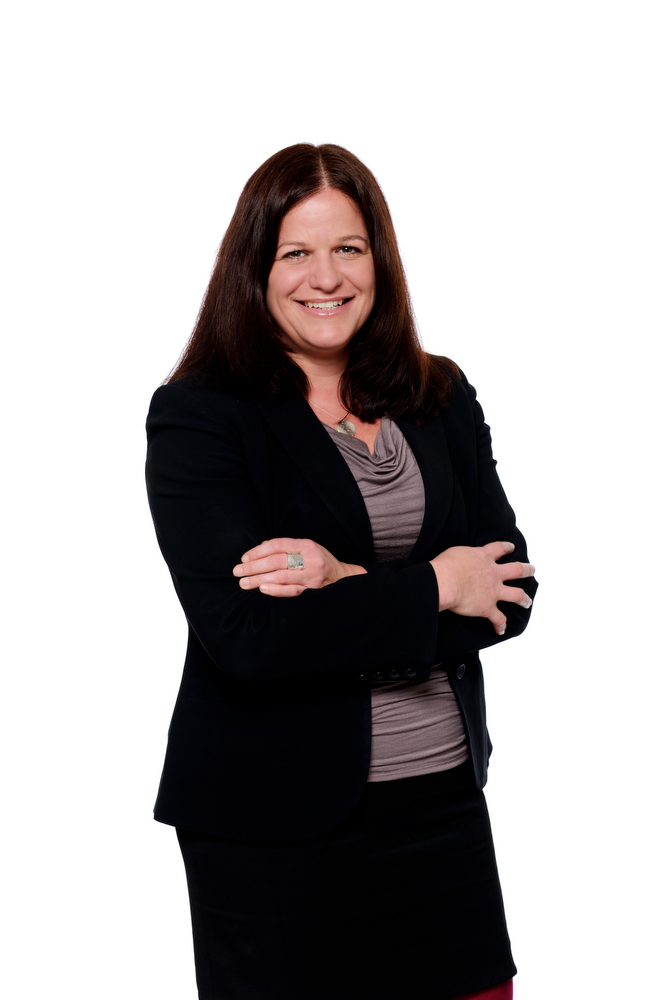 Laurie Valeriano: The Activist
Laurie Valeriano: The Activist
Executive director, Washington Toxics Coalition
You might not be familiar with Laurie Valeriano or the Seattle-based nonprofit that she leads, Washington Toxics Coalition. But chances are you experience the positive effects of their work every day.
Want a baby bottle that does not contain bisphenol A (BPA), a hormone-disrupting chemical that’s been linked to adverse health effects ranging from cancer to miscarriage? These bottles are available and labeled, thanks in part to a 2010 ban Washington Toxics Coalition championed in the state Legislature.
Perhaps you’d like your kids to play with toys that are free of phthalates, lead and cadmium? Led by Washington Toxics Coalition’s work, in 2008 Washington state passed tough standards for toys, which, in turn, inspired national legislation.
Want to diaper your baby on a changing pad that’s not loaded with toxic flame retardants that get into dust, kids’ bodies and breast milk? Valeriano and her team secured a state ban on one type of flame retardant in 2007, and they are at work on another bill that would spur use of safer alternatives.
“I feel extremely proud of our work,” says Valeriano. “But I know there is still so much to do. Parents should not have to be scientists to protect their kids from harmful chemicals.”
A dynamic mother of three, Valeriano began working on environmental health issues as a college student in New York state. She joined Washington Toxics Coalition in 1995, and as its policy director and then executive director, has helped to make the nonprofit a national leader.
State Sen. Sharon Nelson, who has worked closely with Washington Toxics on several bills, says that Valeriano is an extremely effective leader who combines persistence and passion with infectious enthusiasm.
“She is excellent at the work she does.”
How does she juggle it all? “I get up every morning excited to do what I do,” says Valeriano, a single mom to a 12-year-old and 9-year-old twins. “It’s my passion. It’s hard, and I’m not perfect, but with the help of my family and friends, I tackle another day.”
— Elisa Murray
Who’s your personal hero?
My mother, who works so incredibly hard every day. She never stops. She was a stay-at-home mother until I went to junior high school, and then she worked for libraries and the school system.
What quality do you most admire in others?
Tenacity, hard work and just not giving up.
Best recent read?
Breaking Trail by scientist and mountain climber Arlene Blum
How do you take your coffee?
Grande Americano with 2 percent milk.



